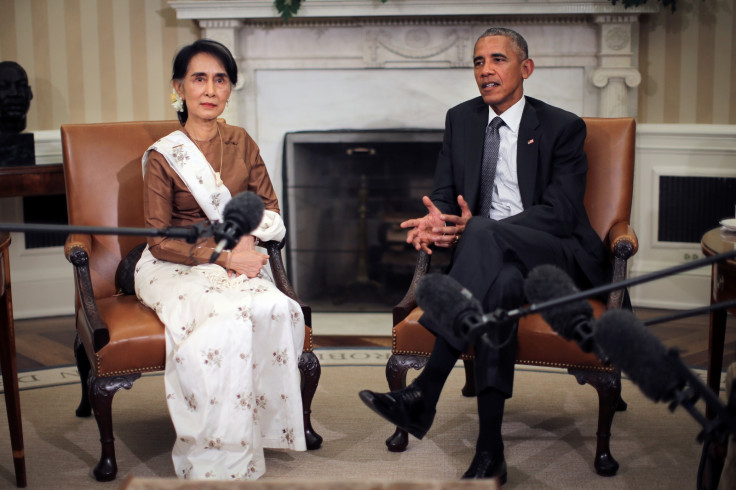Obama pledges to lift sanctions on Myanmar after Aung San Suu Kyi visit
The sanctions were originally imposed in 1997 to isolate Myanmar's former military junta.
US President Barack Obama on Wednesday said he was ready to lift economic sanctions on Myanmar after meeting the leader of the Asian nation, Aung San Suu Kyi at the White House.
"It is the right thing to do in order to ensure that the people of Burma see rewards from a new way of doing business and a new government", Obama said. Myanmar was formerly called Burma, a name the US still uses while referring to the country.
He added, "In part because of the progress we've seen over the last several months, I indicated after consulting with Daw Suu that the United States is now prepared to lift sanctions we've imposed upon Burma for quite some time."
The two leaders in a joint statement said that Myanmar would also be given a preferential trade status "in light of progress on a number of fronts, including strengthening protections for internationally recognized worker rights."
The White House also said in a statement that US will restore Myanmar to GSP or Generalised System of Preferences, which provides duty-free treatment of goods from poor or developing countries. It was removed from GSP in 1989 after pro-democracy protests a year earlier were violently suppressed by the then ruling military junta. The country will be back on the GSP programme on 13 November, US authorities said.
After her meeting with Obama, Suu Kyi said, "We have a constitution that is not very democratic, because it gives the military a special place in politics."
A senior US official told Reuters the lifting of sanctions would not involve military-to-military assistance. The State Department said many constraints would still remain in place, including a long-standing arms ban and barring visas for military leaders.
The sanctions were first imposed in 1997. According to NPR, they were originally imposed to isolate Myanmar's former military junta. However, the military still has a control over the economy and has political power.
In 2012, the Obama administration started to ease some financial and investment sanctions after political reforms, according to the Treasury Department. According to the Associated Press news agency, the US government retained sanctions on military-owned companies and scores of officials of the former ruling junta. The South-East Asian country elected its first civilian president after decades in March this year.
Aung San Suu Kyi, who was under house arrest for almost 15 years, is ineligible to become the president of the country, as her two sons are British citizens. She would be eligible if changes are made to the constitution, which would require the support of a big chunk of the military's voting bloc in the parliament and according to leaders, it is not likely to happen. She is considered to be the symbolic leader of the country and her official title is State Counsellor.
Activists have expressed concern over the condition of ethnic minorities in the Southeast Asian country. Scores of Rohingya Muslims have been the target of sectarian violence, which forced them to flee to neighbouring countries like Thailand and Malaysia.

© Copyright IBTimes 2025. All rights reserved.





















